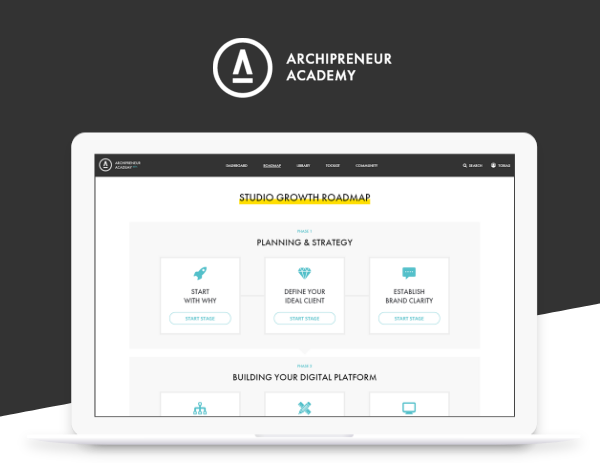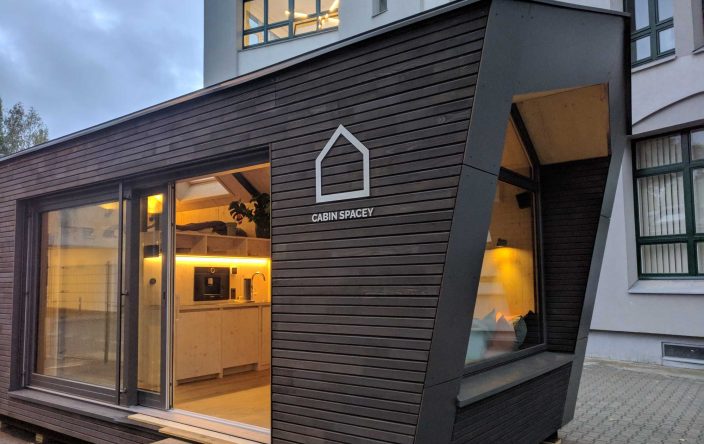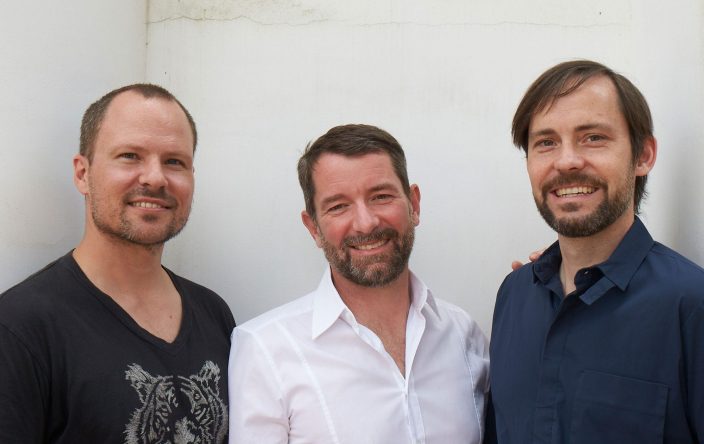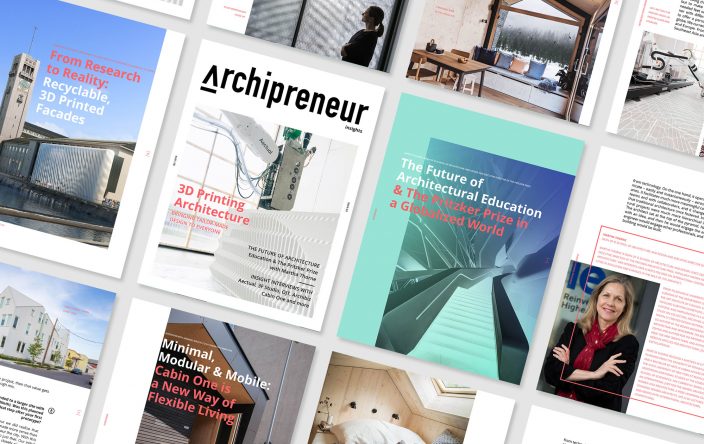
The Story Behind Monograph.io – a Beautiful Website Builder Tool from Architects for Architects
A very warm welcome to Archipreneur Insights, the interview series with the architectural, design and building communities’ movers and shakers. In this series we get to grips with their opinions, thoughts and practical solutions and learn how to apply their ideas to our own creative work for success in the field of architecture and beyond.
This week’s interview is with Robert Yuen, Co-Founder of Monograph.io and Partner at Dixon & Moe, a technology company that is based in San Francisco, CA.
Monograph is a website builder and concierge service designed for architects. Dixon & Moe was founded by architects, engineers and designers with a mission to help the AEC industry develop and deploy software solutions.
Robert is a great example of an architect who is pushing the traditional boundaries of the job profile and developing digital technologies within the architectural market, making him a perfect fit to the archipreneur concept. Read on to hear more about Robert’s background, what he learned along the way, and his advice to up-and-coming archipreneurs.
Enjoy the interview!
P.S. If you do not yet have a website and plan to develop one, make sure you try out Monograph.io!
Could you tell us a little about your background?
Sure, I did my undergrad in Architecture at the University of Illinois, Chicago, followed by a master’s degree at the University of Michigan. I also did a postgraduate degree, with a focus on the use of robotics in architecture and digital fabrication. I then worked for a number of years—spending a short period of time at Skidmore, Owings & Merrill (SOM) in Chicago—before I relocated to San Francisco, where I currently reside.
I’ve worked as an architectural designer across a vast spectrum of work, from prefab at Blu Homes, skyscrapers at SOM, to high-end residential and design build.
Why did you focus on robotics?
Ever since I can remember, I’ve had a great interest in technology. In part, this is why I chose the University of Michigan as the best place for me to attend graduate school, as their School of Architecture had heavily invested in robotics, digital fabrication tools and the faculty to teach advancing technology in architecture. I am extremely interested in the advancement of architecture through a wave of technological advances such as robotics, automation, and software.
And now you are focusing on digital technologies within the field of architecture, is that right?
That’s correct. Immediately after graduate school, I started my first company, an educational consultancy called Section Cut (sectioncut.com). Its goal is to demystify architectural education and to effectively “close the gap” between the various schools of architecture through the use of a bookmarking tool. This tool slices through the Internet to create a crowd-sourced library of resources and information for architectural students. I’ve been working on Section Cut part-time since 2012.
Not long ago, I met Alex Dixon and Moe Amaya, who also have a background in architecture. They have a Master of Architecture from MIT, and immediately after their studies they started building software, websites and web applications. Shortly after our meeting, we partnered to form the digital agency Dixon & Moe.
Dixon & Moe is a boutique software development and design consultancy focused on building applications and digital products primarily in the AEC industries. We’re one of the few consultancies in the world that can take an idea or problem from end to end with domain knowledge in architecture, engineering and construction. Because of the agency, we’ve built a number of websites for architects before the idea for Monograph was born.
Okay, so Monograph.io is Dixon & Moe’s first actual product?
Correct. The agency runs on a service based model, and Monograph is our first digital product designed to be product oriented. It’s a web platform, website builder and concierge service designed for the architectural profession. So, it is very different compared to other digital products out there. We understand the industry and that architects need a little help along the way, thus a hybrid business model was born.

Could you elaborate on how Monograph works? And what is the business model behind it?
Monograph is designed to be a software as a service (SaaS) model. SaaS is simply a fancy way of saying that it’s a subscription based model for access to technology. Our subscription based model is on a monthly or annual plan that includes the concierge service for free.
So if I have a small architecture firm and I want to build my website with Monograph, then I can go to your website where I can buy a subscription, choose a website theme, and help me build and migrate content over, right?
Correct. We’re like a small extension of your team, so you’re not completely alone. We’re industry experts in the web world, so if you have questions about SEO, or file and image optimization, or if you want to understand the best practices for consistency of updates and digital presentation, or if you need pro tips on managing social media networks, we’re here to help.
We’re also quite different from WordPress. Our complete platform is designed to be wysiwyg. That’s an acronym for “what you see is what you get.” Unlike a WordPress site where a lot of backend work is involved, when you’re logged in to our system the page you’re editing will look exactly the same as your front end website will look when it goes live, making it much easier to edit. If you can use Facebook and LinkedIn, you can absolutely use Monograph, no coding is required at all.
That is great, because architects are very visual and value aesthetics, right?
Yes, agreed! My partners and I had designed a number of websites for architects prior to developing Monograph. As trained architects, we understand the value of a profession that is heavily based on visual communication. A firm’s website is an extension of its portfolio and a representation of its practice online, so it is important to present it well across all media devices. We understand that the industry is primarily referral based, but a website is essentially a further reassurance to potential new clients.
What were the responses when you first launched Monograph?
Fantastic. It’s been a full sprint. We’ve only been live for three months and already have over 150 architects on board.
Great! How do you plan to grow the business?
Unlike other SaaS products, Monograph will largely depend on word of mouth. I hope to have a few more interviews, podcasts, and conferences in the coming months to get the word out. Our model is one currently is based on online marketing and word of mouth. This ideal plan for use to continue work and prioritize quality for our users.
Some of our clients and friends refer to us as a startup. I personally don’t like that word. Startups have the connotation that focuses on massive growth with an idea that necessitates venture capital first above quality and profitability. I see us as a small business, providing a value-first concept to the industry; our customers come first. We will continue to grow our business with this “small business” mentality which will help us build the right company for the industry.

Do you think that there is potential for architects to work with digital technologies?
I think so. As time goes on, the automation of construction and building technologies will vastly increase. I don’t know how much of it will impact architecture; I think the first impact will be seen in construction due to the size and scale of that industry relative to architecture.
I think the role of the architect will change in the coming years, with a primary focus on how architects will engage with advancing digital technologies. Learning to work with, direct, and design within automated construction, and leading the charge for developing new pedagogy and paradigms will inform how we move forward.
How has your architectural training helped you in the actual running of your business? What specific/transferable skills have proved the most useful?
Honestly, I think most architects are not trained very well to be business people. It’s not part of the curriculum of architecture as there’s already so much to learn.
But what architectural training does do is it encourages a creative mindset and promotes openness, scrappiness, a hard working ethic, receptiveness to criticism, and ensures you iterate and test solutions once they have been developed.
This is something people in other industries have a hard time learning because these types of skills are not in their foundational toolkit. To design, to edit, to re-design, to look at problems in a different light: all these traits are extremely important and valuable in running a business.
Do you think that business courses should be implemented into architectural education to better prepare students for work life?
I think it’s really important to at least get a very broad overview, perhaps something like a Business 101 class, which just touches upon business formation typologies, contracts, and negotiation skills. We don’t have to dive too deep. But at least that would mean you’re not graduating with zero experience of business. To focus on a curriculum that teaches a mindset that expands on how transferable skills from studio to business would be an extremely exciting course to take.
Do you have any advice for archipreneurs who are interested in starting their own business?
I would say: don’t be afraid. The best advice is to get rid of internal barriers to helping you achieve success. Once that fear disappears, then you can look at the situation more logically and focus on developing a business plan and strategy. Eliminating the fear and the “I can’t” feeling is a really important first step.
You are living in San Francisco. Is the local startup environment there helpful for growing your business?
Looking back on some of the decisions that I’ve made to make things simpler, I have found that the contacts I have gathered in my local environment have been very, very important for my work.
I strongly believed if you are very passionate about being entrepreneurial, you should surround yourself with likeminded people. You have to surround yourself with contacts who can help foster the kind of spirit to push you forward. I think that’s very important. And it’s the fastest way to learn! Being in San Francisco, provided me the context and resources need to build a business.
How do you see the future of the architectural profession? In which areas (outside of traditional practice) can you see major opportunities for up and coming architects?
Generally speaking, I think that architecture has been one of the most technologically underserved industries thus far, so there’s a lot of room for archipreneurs to come in and provide value and assistance. The industry is slow, so there is a lot of room to grow and make processes more efficient.
I think technology companies are currently seeing a lot of potential in the AEC industries. Opportunities are rich for architects to engage with various kinds of advancement.
There’s a number of technology companies that have a great deal of interest in architecture, construction and cities. So there are a lot of possibilities for architects to operate outside of the traditional practice of architecture. I’m a strong believer that being an entrepreneur is more of a mindset than a job title. You can develop the mindset of being an entrepreneur by assisting larger companies, providing your expertise on the built environment.
One of my greatest interests in the future of architecture is the automation of digital fabrication in architecture and design build. I would love to work on introducing rapid prototyping and robotic assemblies onsite.
About Robert Yuen
Robert Yuen was born in Chicago, IL., USA. An entrepreneur, strategist, and architectural designer, he received his M.Arch and MSc. in Digital Technologies from the University of Michigan. He is now Partner at Dixon & Moe, Co-Founder of Section Cut and Co-Founder of monograph.io.
Robert’s key mission is to elevate the AEC industry by developing and designing specific software applications for architects, engineers and designers. With domain knowledge and expertise in marketing, strategy, and architecture, his interests are in consulting on real world problems and in taking digital ideas from end to end.
Join our Newsletter
Get our best content on Architecture, Creative Strategies and Business. Delivered each week for free.

JOIN THE
ARCHIPRENEUR ACADEMY
- 9 Stage Studio Growth Roadmap
- Library of In-Depth Courses
- Checklists and Workbooks
- Quick Tips and Tutorials
- A Supportive Online Community















